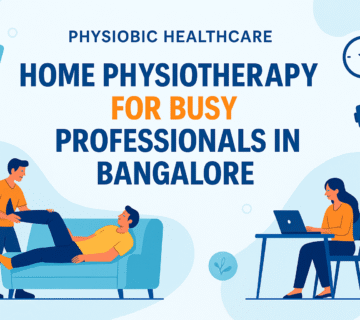Introduction
Paralysis, a condition characterized by the loss of muscle function in one or more parts of the body, can result from various factors, including stroke, spinal cord injury, neurological disorders, or trauma. It poses significant challenges for individuals and their families, affecting mobility, independence, and overall quality of life. In Bangalore, where urbanization and lifestyle diseases are on the rise, the demand for effective rehabilitation services, particularly physiotherapy at home, is growing. This article explores the role of home-based physiotherapy services for paralysis patients, focusing on the offerings of Physiobic Healthcare in Bangalore.
Understanding Paralysis
Paralysis can be classified into different types, including:
- Hemiplegia: Paralysis on one side of the body, often resulting from a stroke.
- Paraplegia: Paralysis of the lower half of the body, typically caused by spinal cord injury.
- Quadriplegia: Paralysis of all four limbs, often resulting from severe spinal cord injuries.
Each type requires a tailored rehabilitation approach to maximize recovery and improve functional outcomes.
Causes of Paralysis
Understanding the underlying causes of paralysis is crucial for effective treatment. Some common causes include:
- Stroke: Sudden interruption of blood supply to the brain, leading to loss of function in affected areas.
- Spinal Cord Injury: Damage to the spinal cord from trauma, leading to varying degrees of paralysis.
- Neurological Disorders: Conditions such as multiple sclerosis, amyotrophic lateral sclerosis (ALS), and cerebral palsy can result in paralysis.
- Infections: Conditions like poliomyelitis can lead to paralysis due to viral infections.
The Importance of Physiotherapy in Paralysis Rehabilitation
Physiotherapy plays a crucial role in the rehabilitation of paralysis patients. It aims to:
- Restore Mobility: Physiotherapists employ various techniques and exercises to enhance strength and coordination, facilitating the return to normal mobility.
- Prevent Complications: Bedridden patients are at risk of complications such as pressure sores, muscle atrophy, and joint stiffness. Regular physiotherapy helps mitigate these risks.
- Enhance Quality of Life: By improving physical function, physiotherapy can significantly enhance the overall quality of life for patients and their families.
- Psychological Support: The rehabilitation process can also address mental health issues, helping patients cope with the emotional toll of paralysis.
Home-Based Physiotherapy: A Necessity
Home-based physiotherapy services are particularly beneficial for paralysis patients for several reasons:
- Comfort and Convenience: Patients often feel more relaxed and motivated in their familiar surroundings. This comfort can lead to better engagement during therapy sessions.
- Personalized Care: Home physiotherapy allows for individualized treatment plans tailored to the patient’s specific needs and environment.
- Family Involvement: Physiotherapists can educate family members on how to assist with exercises and care, fostering a supportive rehabilitation environment.
- Accessibility: For patients with limited mobility, traveling to clinics can be challenging. Home-based services eliminate this barrier.
- Reduced Fatigue: Home sessions can help conserve energy, allowing patients to focus on rehabilitation without the added stress of travel.
Physiobic Healthcare: Leading the Way in Home Physiotherapy
Physiobic Healthcare, a prominent provider of physiotherapy services in Bangalore, specializes in delivering personalized home physiotherapy for paralysis patients. Their team comprises skilled physiotherapists with expertise in neurological rehabilitation, ensuring that patients receive the highest quality care.
Services Offered by Physiobic Healthcare
- Initial Assessment: Each patient’s journey begins with a comprehensive assessment to understand their specific condition, mobility levels, and rehabilitation goals. This includes evaluating strength, range of motion, and functional capabilities.
- Tailored Treatment Plans: Based on the assessment, physiotherapists design customized treatment plans that may include:
- Strength Training: Targeted exercises to rebuild muscle strength and endurance, utilizing resistance bands or weights as appropriate.
- Range of Motion Exercises: Activities to maintain and improve joint flexibility, crucial for preventing stiffness.
- Functional Training: Techniques to enhance daily living activities, such as sitting, standing, and walking, which can include gait training.
- Neuromuscular Re-education: Exercises aimed at improving coordination and balance, which are often compromised in paralysis patients.
- Pain Management: Techniques such as heat therapy, electrical stimulation, or manual therapy to alleviate discomfort and improve overall function.
- Education and Support: Physiobic’s therapists educate patients and families on the nature of paralysis and the rehabilitation process. This knowledge empowers them to take an active role in the recovery journey. Educational materials and workshops can also be provided to enhance understanding.
- Regular Progress Monitoring: Continuous assessment of the patient’s progress ensures that the treatment plan remains effective. Adjustments can be made based on the patient’s evolving needs and goals.
- Technology Integration: Physiobic Healthcare may utilize telehealth platforms to supplement in-person visits, providing additional support and guidance through virtual sessions.
Success Stories for Paralysis Physiotherapy at Home Bangalore
Numerous patients in Bangalore have benefitted from Physiobic’s home physiotherapy services. For example, a patient recovering from a stroke experienced significant improvements in mobility and independence after several weeks of tailored physiotherapy sessions. Another case involved a young man with paraplegia who, through consistent therapy, regained partial movement and improved his ability to perform daily tasks. Such success stories highlight the effectiveness of personalized home care in rehabilitation.
Challenges in Home-Based Physiotherapy
While home physiotherapy offers numerous advantages, it also presents some challenges:
- Motivation: Patients may struggle with motivation in a home environment. Physiotherapists often employ strategies, such as setting achievable goals, to keep patients engaged.
- Family Dynamics: The involvement of family members can be beneficial, but sometimes it may lead to tension if expectations are misaligned. Educating family members on their role in the rehabilitation process is crucial.
- Space and Equipment: Not all homes are equipped with the necessary space or equipment for effective physiotherapy, which may limit some interventions. Physiobic Healthcare often recommends simple adaptations to make home environments more conducive to therapy.
- Consistency of Care: Ensuring regular sessions can be challenging if family members have commitments or if unforeseen circumstances arise.
The Future of Home Physiotherapy in Bangalore
As the demand for rehabilitation services continues to grow in Bangalore, the future looks promising for home physiotherapy. Key trends influencing this growth include:
- Technological Advancements: Innovations such as telehealth and remote monitoring tools are enhancing the ability of physiotherapists to provide care and track patient progress effectively.
- Increased Awareness: Greater public awareness of the importance of early intervention and rehabilitation is likely to drive more families to seek home-based physiotherapy solutions.
- Collaborative Care Models: Integrating home physiotherapy with other healthcare services, including occupational therapy and speech therapy, can provide a more holistic approach to rehabilitation.
- Policy Support: As governments and health organizations recognize the value of home-based care, policies may evolve to support its integration into mainstream healthcare services.
Conclusion
Paralysis is a life-altering condition that requires comprehensive and ongoing rehabilitation. Home-based physiotherapy services, particularly those offered by Physiobic Healthcare in Bangalore, provide a vital lifeline for patients and their families. By focusing on personalized care, convenience, and family involvement, these services not only enhance recovery but also improve overall quality of life.
As the healthcare landscape continues to evolve, the integration of home physiotherapy will play an increasingly critical role in the rehabilitation of paralysis patients, making recovery accessible and effective. For those seeking physiotherapy at home in Bangalore, Physiobic Healthcare stands out as a trusted partner in the journey toward recovery and improved well-being.



